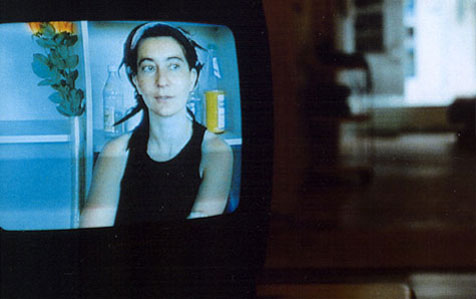

BORDER CROSSINGS A Project in the context of the International Women's University (ifu)in Hannover 2000 within the temporary home exhibition. (Coordinators and Initiators of the temporary home project: Farida Heuck and Tineke E. Jansen) |
|||||||||
 |
|||||||||
The former hairdressing salon is located in the busiest shopping street of a pre-WWII workers' area, also populated by many labor migrants from Turkey and Marocco. We turn the place into an alien living quarter, an oddity among shops. Each object cluster in the installation represents a research subject chosen by a participant - her interpretation of collected interviews. Migrant experiences serve as a common thread. My part of the installation dealt with border crossings. In order to attend the International Women's University a thousand women came to Germany for three month from over 120 countries all over the world. All of them had different experiences at the immigration desk entering Germany. |
|||||||||
|
|||||||||
"For me coming to Germany was totally... I can't remember anything special at the border control at all. I remember a big sea of people standing around at the airport. I showed my passport there but it was just through, through, and then my next memory is picking up the luggage." |
|||||||||
|
|||||||||
"Being a Singaporean usually I don't have too many problems crossing borders. Ahead of me there was an Asian-looking man and the immigration officer really took a long time with his passport. That once again reminds me of being coloured and a black person. Even so, I am such a frequent traveller that this often reinforces my insecurity that I will be asked very difficult questions and constantly having to search for the right answers, the quick answers in order to get through the border as trouble-free as possible." |
|||||||||
|
|||||||||
And then the other thing I fined really peculiar here which we don't have in Britain is the whole Identity-Card thing. So I carry my passport around with me because I have been told if you don't carry it around with you and you get stopped by the police and you get asked for it and then you know you get fined or whatever..." (see Tineke E. Jansen and Farida Heuck, Temporary Home, Page 107 f, in: Remote Sensing - Laboratories of Art and Science, eds: Leonie Baumann, Adrienne Göhler, Barbara Loreck, Vice Versa, Berlin 2002) |
|||||||||